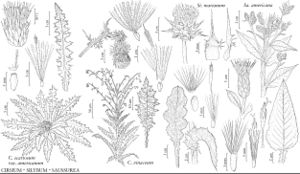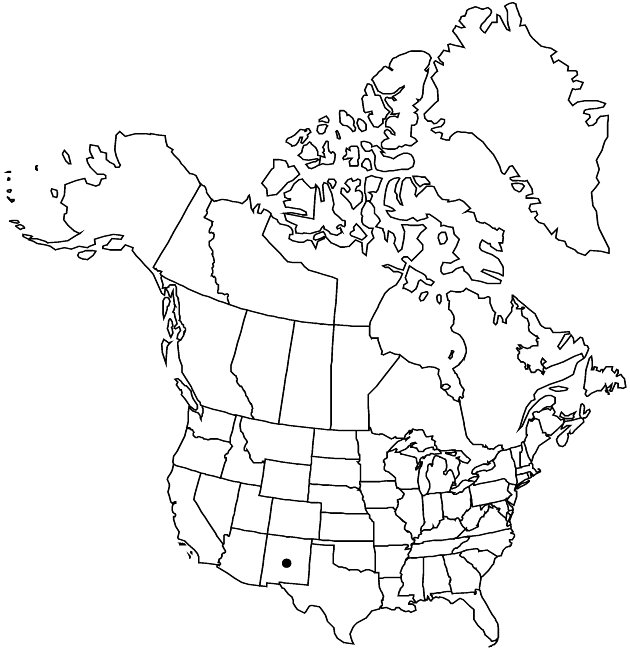Difference between revisions of "Cirsium vinaceum"
Contr. U.S. Natl. Herb. 19: 751. 1915.
FNA>Volume Importer |
imported>Volume Importer |
||
| (2 intermediate revisions by 2 users not shown) | |||
| Line 8: | Line 8: | ||
}} | }} | ||
|common_names=Sacramento Mountains thistle | |common_names=Sacramento Mountains thistle | ||
| + | |special_status={{Treatment/ID/Special_status | ||
| + | |code=F | ||
| + | |label=Illustrated | ||
| + | }}{{Treatment/ID/Special_status | ||
| + | |code=E | ||
| + | |label=Endemic | ||
| + | }}{{Treatment/ID/Special_status | ||
| + | |code=C | ||
| + | |label=Conservation concern | ||
| + | }} | ||
|basionyms={{Treatment/ID/Basionym | |basionyms={{Treatment/ID/Basionym | ||
|name=Carduus vinaceus | |name=Carduus vinaceus | ||
| Line 54: | Line 64: | ||
|publication title=Contr. U.S. Natl. Herb. | |publication title=Contr. U.S. Natl. Herb. | ||
|publication year=1915 | |publication year=1915 | ||
| − | |special status= | + | |special status=Illustrated;Endemic;Conservation concern |
| − | |source xml=https:// | + | |source xml=https://bitbucket.org/aafc-mbb/fna-data-curation/src/2e0870ddd59836b60bcf96646a41e87ea5a5943a/coarse_grained_fna_xml/V19-20-21/V19_169.xml |
|tribe=Asteraceae tribe Cardueae | |tribe=Asteraceae tribe Cardueae | ||
|genus=Cirsium | |genus=Cirsium | ||
Latest revision as of 19:48, 5 November 2020
Perennials, 100–200 cm; creeping roots. Stems 1, erect, (dark maroon), glabrous; branches several to many, stiffly ascending, distally nodding. Leaves: blades elliptic, 10–50 × 5–20 cm, 1–2 times pinnately lobed or divided, lobes lanceolate to ovate, main spines slender to stout, 3–10 mm, faces glossy green, glabrous; basal present at flowering, petiolate or winged-petiolate, divided nearly to midveins; proximal cauline winged-petiolate; mid and distal sessile, progressively reduced, less deeply lobed, bases auriculate-clasping; distalmost linear or lanceolate, bractlike, very spiny. Heads many, nodding, borne 1–few at branch tips, collectively forming open, paniculiform arrays. Peduncles 0.5–15+ cm. Involucres (excluding spreading tips) broadly ovoid to hemispheric or campanulate, 2–3 × 2–3 cm, glabrous. Phyllaries in 8–10 series, strongly imbricate, (dark maroon, drying dark brown or blackish), ovate or lanceolate (outer) to linear-lanceolate (inner), abaxial faces with poorly developed glutinous ridge; outer and mid bases appressed, margins entire, apices spreading to reflexed, elongate, ovate to lanceolate, 5–20 mm, flattened, ciliolate, adaxially minutely villous with septate trichomes, spines slender, 1–3 mm; apices of inner flexuous, entire. Corollas rich rose-purple, 20–26 mm, tubes 4–5 mm, throats 7–10 mm, lobes 10–11 mm; style tips 2–2.5 mm. Cypselae brown, ca. 5 mm, apical collars not differentiated; pappi (brown), 18–20 mm.
Phenology: Flowering spring–summer (May–Sep).
Habitat: Wet soil around calcareous springs and seeps, stream banks, montane meadows, coniferous forest margins
Elevation: 2300–2900 m
Discussion
Of conservation concern.
Cirsium vinaceum is perhaps most closely related to C. rydbergii. Heads of C. vinaceum are actively visited by hummingbirds and by several kinds of bees (K. A. Burks 1994). Hybrids are known between C. vinaceum and C. wrightii.
Cirsium vinaceum is endemic to the Sacramento Mountains, Otero County. It is in the Center for Plant Conservation’s National Collection of Endangered Plants.
Selected References
None.

